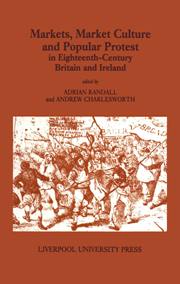Book contents
- Frontmatter
- Contents
- Contributors
- Preface
- 1 Markets, Market Culture and Popular Protest in Eighteenth-Century Britain and Ireland
- 2 Popular Protest and the Persistence of Customary Corn Measures: Resistance to the Winchester Bushel in the English West
- 3 The Jack-a-Lent Riots and Opposition to Turnpikes in the Bristol Region in 1749
- 4 The Cider Tax, Popular Symbolism and Opposition in Mid-Hanoverian England
- 5 Scarcity and the Civic Tradition: Market Management in Bristol, 1709–1815
- 6 The Moral Economy of the English Middling Sort in the Eighteenth Century: the Case of Norwich in 1766 and 1767
- 7 Oxford Food Riots: a Community and its Markets
- 8 The Irish Famine of 1799–1801: Market Culture, Moral Economies and Social Protest
- Index
6 - The Moral Economy of the English Middling Sort in the Eighteenth Century: the Case of Norwich in 1766 and 1767
- Frontmatter
- Contents
- Contributors
- Preface
- 1 Markets, Market Culture and Popular Protest in Eighteenth-Century Britain and Ireland
- 2 Popular Protest and the Persistence of Customary Corn Measures: Resistance to the Winchester Bushel in the English West
- 3 The Jack-a-Lent Riots and Opposition to Turnpikes in the Bristol Region in 1749
- 4 The Cider Tax, Popular Symbolism and Opposition in Mid-Hanoverian England
- 5 Scarcity and the Civic Tradition: Market Management in Bristol, 1709–1815
- 6 The Moral Economy of the English Middling Sort in the Eighteenth Century: the Case of Norwich in 1766 and 1767
- 7 Oxford Food Riots: a Community and its Markets
- 8 The Irish Famine of 1799–1801: Market Culture, Moral Economies and Social Protest
- Index
Summary
INTRODUCTION
John Seed has recently remarked upon the tendency of social historians of the nineteenth century ‘… whose attention has been concentrated upon the working class, or to a lesser extent, the landed aristocracy and gentry’, to produce a distorted image of the prevailing class structure, due to the absence of a middle class. The same has been even more true of social historians of the eighteenth century. Where middling people do appear, it is rarely as the figures of power and influence upon which the structures for the administration of the local state were based, nor as the local arbiters of approved behaviour, morals and values. There is a tendency to underestimate the influence, power and political importance of the middling sort at a local level and to oversimplify and misconstrue their characteristic social and political attitudes. They appear as prototypes for the consumerism of a later middle class or, in work on the moral economy, most often as stage villains who serve as theatrical props against which moral economist proletarians and paternalist gentry may demonstrate their value systems, either in conflict or in agreement with each other. The case of the Norwich food riots of 1766 and their aftermath shows the middling sort of the city behaving very differently.
At the start of the eighteenth century, Norwich was the largest town in England, London excepted, and was half as large again as Bristol, its nearest rival.
- Type
- Chapter
- Information
- Markets, Market Culture and Popular Protest in Eighteenth-Century Britain and Ireland , pp. 115 - 136Publisher: Liverpool University PressPrint publication year: 1996

